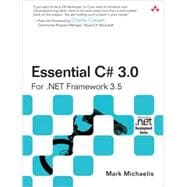
Mark Michaelis is an enterprise software architect at Itron Inc. In addition, Mark recently started intelliTechture, a software engineering and consulting company offering high-end consulting in Microsoft VSTS/TFS, BizTalk, SharePoint, and .NET 3.0. Mark also serves as a chief software architect and trainer for IDesign Inc.
Mark holds a B.A. in philosophy from the University of Illinois and an M.S. in computer science from the Illinois Institute of Technology. Mark was recently recognized as a Microsoft Regional Director. Starting in 1996, he has been a Microsoft MVP for C#, Visual Studio Team System, and the Windows SDK. He serves on several Microsoft software design review teams, including C#, the Connected Systems Division, and VSTS. Mark speaks at many developer conferences and has written numerous articles and books.
When not bonding with his computer, Mark is busy with his family or training for the Ironman. Mark lives in Spokane, Washington, with his wife Elisabeth, and three children, Benjamin, Hanna, and Abigail.
| Figures | p. xxiii |
| Tables | p. xxv |
| Foreword | p. xxvii |
| Preface | p. xxxi |
| Acknowledgments | p. xliii |
| About the Author | p. xlv |
| Introducing C# | p. 1 |
| Hello, World | p. 2 |
| Working with Variables | p. 12 |
| Comments | p. 19 |
| Data Types | p. 31 |
| Fundamental Numeric Types | p. 32 |
| More Fundamental Types | p. 40 |
| null and void | p. 51 |
| Categories of Types | p. 55 |
| Nullable Modifier | p. 57 |
| Conversions between Data Types | p. 58 |
| Arrays | p. 65 |
| Operators and Control Flow | p. 83 |
| Operators | p. 84 |
| Introducing Flow Control | p. 98 |
| Code Blocks ({}) | p. 105 |
| Scope | p. 107 |
| Boolean Expressions | p. 108 |
| Bitwise Operators ( >, , &, ^, | |
| Table of Contents provided by Publisher. All Rights Reserved. |
The New copy of this book will include any supplemental materials advertised. Please check the title of the book to determine if it should include any access cards, study guides, lab manuals, CDs, etc.
The Used, Rental and eBook copies of this book are not guaranteed to include any supplemental materials. Typically, only the book itself is included. This is true even if the title states it includes any access cards, study guides, lab manuals, CDs, etc.